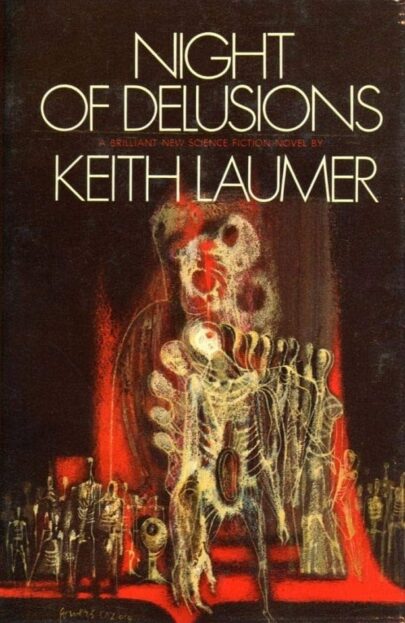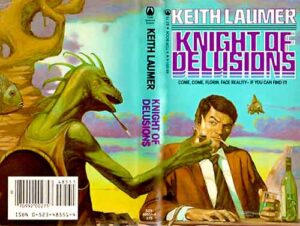By KEITH LAUMER (Putnam; 1972/74)
Back in 1993, author David Keller lamented that “Philip K. Dick books have been getting little to no shelf space in recent years in the bookstores where most people buy books.” Yes, it took bookstores and the mainstream media, awhile to take note of the brilliance of PKD, but the science fiction community was quick to recognize his talents. Many 1970s-era sci fi novels, such as THE FUTUROLOGICAL CONGRESS by Stanislaw Lem, THE LATHE OF HEAVEN by Ursula K. LeGuin and CHRONOLYSIS by Michel Jeury, consciously adopted his style and worldview, as did NIGHT OF DELUSIONS by the prolific Keith Laumer (1925-1993).
The novel’s conception—the interplay of reality and illusion in a futuristic milieu—is certainly Dickian, as are its secondary subjects, which include political corruption, alien invasion and the nature of divinity. It begins in deceptively simple fashion with the first-person narrator, a burnt-out PD named Florin, awakened from a “swell dream” (in which “I almost had my finger on the secret of it all”) by government agents seeking to hire him as bodyguard to a powerful senator who’s apparently gone mad.
The agents’ plan is to render the senator’s delusions concrete, which they hope will force him into paradoxically accepting the facts of objective reality. Thus we’re given a clever foreshadowing of what turns out to be the novel’s major theme, as Florin’s reality grows increasingly unreal. An early appearance by a talking lizard signals that not all is as it seems and, as we learn more about Florian’s situation and the plot in which he finds himself caught up, things get progressively stranger.
Without giving too much away, it transpires that Florin’s occupation, state of mind, present location and identity are all far different than what we were initially led to believe, and that he’s caught in a dream reality akin to the hallucinatory netherworlds of PKD classics like THE THREE STIGMATA OF PALMER ELDRICH and UBIK—and as any Dick reader well knows, discerning precisely where the dream ends and “reality” begins is well-nigh impossible in these worlds, as is the possibility of an escape (if you don’t know what’s real how can you hope to attain reality?).
Keith Laumer, a two-term serviceman and diplomat, was perhaps a bit too conservative in temperament to do justice to the psychedelic excesses of this story. The flavorless prose simply isn’t suited to the reality displacement that increasingly dominates the book, although Laumer’s imagination is quite something to behold. A Philip K. Dick pastiche NIGHT OF DELUSIONS may be, but it can stand with his work, being a worthy candidate for the Best Book PKD Never Wrote.


